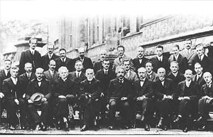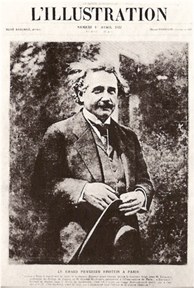Travels, Honours and Distinctions
Texts by Dr. Antonio Moreno González
Despite his independence and his aversion to social niceties, Einstein achieved a level of scientific and public recognition which was unusual at that time for a scientist. He was called on to participate at a whole range of different public events; his name and his image reached every corner of the world. But the most important thing was that among scientists he was respected and his opinions were listened to carefully. People looked forward to his attendance at conferences and meetings with interest and admiration. Speaking about the Solvay Congress of 1927, Bohr, his most recalcitrant quantum opponent, remembers: " At the Solvay meetings, Einstein had been one of the most prominent figures from the outset, and several of us arrived at the congress eager to know his reaction to the last developments [in quantum theory]". In 1911 Einstein already enjoyed the privilege of being one of the twenty physicists invited to the first Solvay congress on radiation theory and quanta.
In 1909 he was awarded an honorary doctorate from the University of Geneva. It was to be the first of many, from some of the most prestigious universities of his time (including the Central University of Madrid), especially after 1919 when he achieved the popularity that was to accompany him for the rest of his life.
In 1921 he first visited the United States, in the company of the Zionist leader Chaim Weizmann, to help raise funds for the creation of the Hebrew University of Jerusalem. He also visited Japan, China, South America, Palestine and travelled extensively within Europe. The purpose of his travels was to disseminate and debate his scientific theories, attend events and celebrations that would benefit from his famous presence and support the Jewish cause for a national homeland. In 1952, on the death of Weizmann, he was offered the presidency of the state of Israel, which he gratefully and respectfully declined, arguing that: "I know a little about nature, but hardly anything about men". In passing, he asked the Israeli ambassador in the United States, who had passed on the proposal, to do everything possible to ensure that "the journalists lift the siege to which they have subjected my house".
Of all Einstein's travels in the 1920s, his stay in Paris from 28 March to 10 April 1922 was particularly important. His theory of relativity, which proved everywhere to be his most appealing and provocative scientific contribution, was soon publicised in France, but many French scientists chose to have nothing to do with it, considering it to be little more than an extravagant passing fad: for them the laws of science had hit their ceiling and only needed a final push to leave a complete edifice built according to the Comptian conception of science. In an attempt to combat this ignorance, Paul Langevin (1872-1946) tried to bring Einstein to the École de France in 1914, but the outbreak of World War I frustrated the attempt.
Confirmation of his general theory of relativity in 1919, made Einstein famous throughout the world, especially in Britain; in contrast, his extraordinary discoveries were scarcely mentioned in France, though they did spark some heated disputes between French scientists which led to news items and articles in the press. Taking advantage of this inflamed situation, Langevin managed to attract Einstein to Paris, arousing further passion in the aftermath of a war which had greatly heightened tensions between France and Germany. For those who looked on Einstein's presence in France in a good light, he was a wise Swiss; for the opponents, he was simply a German whose presence might offend "very respectable patriotic feelings". The complexity of the theory, the paradoxical figure who aroused "the adoration of an idol no one can understand" and the division between scientists which publicly showed how science was subject to alteration and change, were all echoed in the press, in the university, in scientific institutions, at philosophical gatherings and among people on the street, resulting in a debate which scholars considered "exceptional, but ephemeral".
On 10 November 1922, during his tour of Asia--just months after his trip to France--Einstein received the news that he had been awarded the 1921 Nobel prize "for his services to Theoretical Physics, and especially for his discovery of the law of the photoelectric effect"; he had been a candidate on eight other occasions. The German ambassador in Sweden received the prize on his behalf. Einstein delivered his Nobel lecture to the Nordic Assembly of Naturalists at Gothenburg in July 1923 on "Fundamental ideas and problems of the theory of relativity", which he considered more deserving of the prize. He sent the prize money, $32,500, to Mileva, in compliance with the terms of their divorce settlement. Mileva used the money to buy three properties, the rent from which provided her with a living and covered the costly expenses of psychiatric treatment for their son Eduard.
During the 22 years he lived in Princeton up to his death in 1955, Einstein never travelled outside the United States or received any noteworthy distinctions. At last, he was able to lead the quiet life he had always craved, devoting himself to his studies, to his championing of world peace, to music and sailing as long as his strength allowed. He became one of the many inhabitants of the area, loved and admired by his neighbours, for whom he was always "the professor".

5th Solvay Congress, 1927

On his arrival in Paris, 1922
